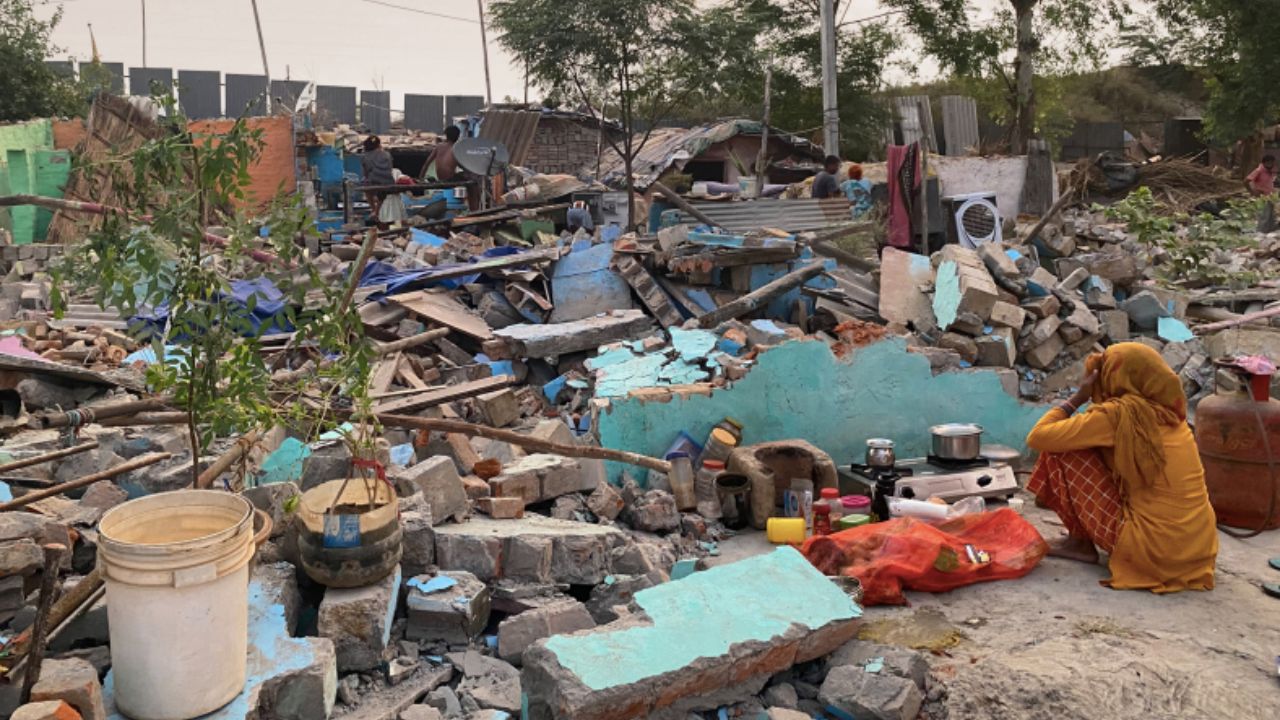According to a recent study, up to 25,800 homes were allegedly demolished by government agencies between January and July 2022, evicting at least 124,450 people, the latest report of the Housing and Land Rights Network (HLRN) has revealed.
The report titled ‘Forced Eviction in India in 2021’, which was released on Wednesday, said, government authorities have evicted at least 567 people per day or 24 people every hour across India.“The eviction occurred despite the third wave of COVID-19 pandemic during January-March 2022,” it said. Court orders and their implementation by state authorities resulted in the eviction of over 106,014 people in at least 11 incidents of demolitions in 2021, HLRN said.
According to the research, more than one million people have been threatened with eviction in the past five years (between 2017 and 2021). The study claimed nearly 15 million people across the country live under the threat of eviction.
Authorities removed 207,106 individuals from their houses in 2021, including 13,750 during the height of the COVID pandemic in April and May of the previous year, for reasons like environment protection, infrastructure projects, encroachment removal, and beautification initiatives across the nation. According to the research, at least 59 percent of them have not been relocated or paid by the government.
The report said that as many as 57% of people were evicted for infrastructure and infrastructure-related projects, 27.13% for infrastructure-related projects, and 14.31% for encroachment clearance and beautification projects. At least 17 states and three Union Territories participated in the demolition drives. According to the report, from January 1, 2021, to July 15, 2022, government authorities destroyed 62,330 homes and evicted more than 331,560 people. It further stated that up until July of this year, approximately 25,800 dwellings in India had been destroyed, having an impact on at least 124,450 individuals. Instances that demonstrate how demolitions were also utilised as “punitive measures” have been cited.
According to the report, the railways destroyed 250 dwellings in Punjabi Bagh in February 2022 to clear the area of “encroachments.” Since they were not relocated, the families have continued to reside on the same property since the demolition.
In the report, executive director of HLRN Enakshi Ganguly said it was “unfortunate that over the years, this situation has only worsened and the magnitude of people displaced has increased despite the intervening pandemic.”
Referring to the various instances where houses were demolished after the communal violence, the report said, “Following the communal violence during the celebrations for the Hindu festivals of Ram Navami and Hanuman Jayanti in April 2022 in Madhya Pradesh, 16 houses and 29 shops of Muslim households were demolished in Khargone district, including a house built under the Pradhan Mantri Awas Yojana (Housing for All) Scheme.
Statements from government officials and ministers indicated the intention of using demolitions as punishment against those who were viewed by the state as participating in the communal clashes, it added.
“The practice of ‘punitive demolition’ disproportionately targets low-income communities who are already marginalized,” HRLN said it violates all due process norms and established national and international human rights laws and standards.
The NGO urged the state to strongly condemn any evictions, which are “carried out to instil fear and insecurity among specific communities and individuals.”
Pointing out to demolitions that were carried out in Khambat and Himmatnagar in Gujarat where Muslim families were affected, the report revealed how nearly 25 shops, vending carts, and houses primarily belonging to Muslims in Jahangirpuri, Delhi was removed after being termed “encroachments” following the clashes during the Hanuman Jayanti procession on April 2022. Likewise, in June 2022, the municipal authorities in Prayagraj and Saharanpur districts of Uttar Pradesh demolished homes of Muslim families allegedly to remove ‘encroachments’ soon after the community members held protests against controversial remarks against the Prophet Muhammad.
“All the evictions and demolitions have been carried out by government agencies professedly to ‘clear encroachments’ and remove ‘illegal structures’ from public land, the report said. “However, the state authorities have used this reasoning to arbitrarily select and demolish settlements.”
The HLRN report said the manner in which communities have been targeted through such selective actions has not gone unnoticed. “Taking cognizance of the alarming situation, in June 2022, the United Nations Special Rapporteur on Adequate Housing along with the UN Special Rapporteurs on freedom of religion and minority issues, sent a joint communication to the Government of India strongly condemning the destruction of Muslim homes and properties by state authorities to mete out “collective punishment” to the community,” it said.
Among the 57% evictions, the reasons for removal are purported, for forest and wildlife protection. “This resulted in the forced eviction and displacement of at least 117,623 people across the country. Many were even evicted in the name of clearance of ‘encroachments’, beautification of the city or conservation of water bodies, natural disasters or court orders.
The group demanded that all the evicted families, waiting to be rehabilitated for years be immediately provided alternative accommodation and the rights to land of urban and rural communities should be recognised.
“Forced evictions lead to the displacement of families, loss of homes and livelihood, disruption of children’s education, severe impact on health, and physical and psychological trauma among other consequences. It disproportionately affects marginalised communities and divests them from accessing the most basic facilities, essential for a life with dignity. The implementation of these recommendations will help bring about justice and restoration of the human rights of affected persons,” it said.
Related
Rabia Shireen is a Staff Reporter at The Cognate.












































